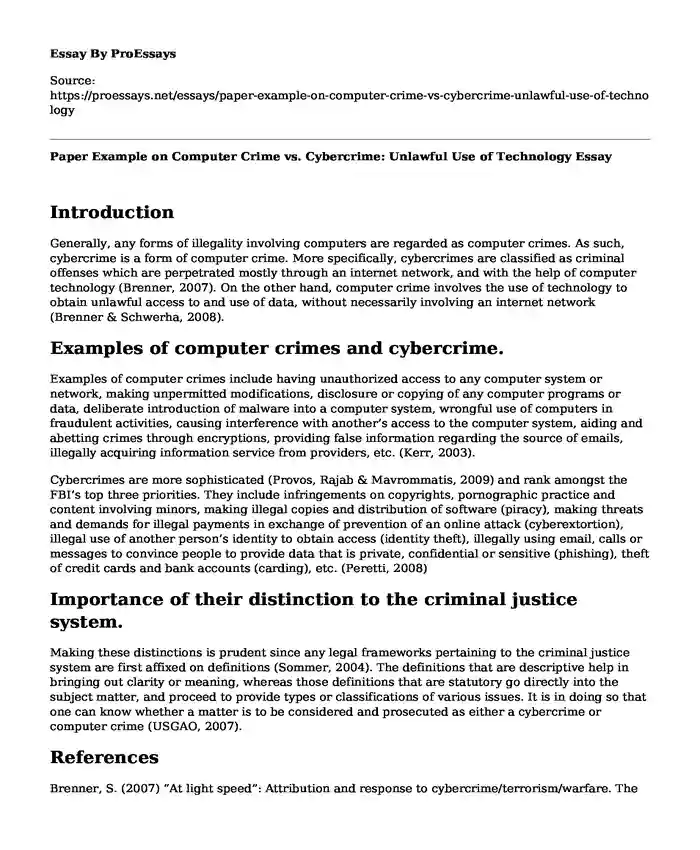Introduction
Generally, any forms of illegality involving computers are regarded as computer crimes. As such, cybercrime is a form of computer crime. More specifically, cybercrimes are classified as criminal offenses which are perpetrated mostly through an internet network, and with the help of computer technology (Brenner, 2007). On the other hand, computer crime involves the use of technology to obtain unlawful access to and use of data, without necessarily involving an internet network (Brenner & Schwerha, 2008).
Examples of computer crimes and cybercrime.
Examples of computer crimes include having unauthorized access to any computer system or network, making unpermitted modifications, disclosure or copying of any computer programs or data, deliberate introduction of malware into a computer system, wrongful use of computers in fraudulent activities, causing interference with another’s access to the computer system, aiding and abetting crimes through encryptions, providing false information regarding the source of emails, illegally acquiring information service from providers, etc. (Kerr, 2003).
Cybercrimes are more sophisticated (Provos, Rajab & Mavrommatis, 2009) and rank amongst the FBI’s top three priorities. They include infringements on copyrights, pornographic practice and content involving minors, making illegal copies and distribution of software (piracy), making threats and demands for illegal payments in exchange of prevention of an online attack (cyberextortion), illegal use of another person’s identity to obtain access (identity theft), illegally using email, calls or messages to convince people to provide data that is private, confidential or sensitive (phishing), theft of credit cards and bank accounts (carding), etc. (Peretti, 2008)
Importance of their distinction to the criminal justice system.
Making these distinctions is prudent since any legal frameworks pertaining to the criminal justice system are first affixed on definitions (Sommer, 2004). The definitions that are descriptive help in bringing out clarity or meaning, whereas those definitions that are statutory go directly into the subject matter, and proceed to provide types or classifications of various issues. It is in doing so that one can know whether a matter is to be considered and prosecuted as either a cybercrime or computer crime (USGAO, 2007).
References
Brenner, S. (2007) “At light speed”: Attribution and response to cybercrime/terrorism/warfare. The Journal of Criminal Law & Criminology 97(2), 379–475.
Brenner, S., & Schwerha IV, J. (2008) Cybercrime havens. The Computer & Internet Lawyer 25(9), 19–21.
Kerr, O. (2003). Cybercrime’s scope: Interpreting “access” and “authorization” in computer misuse statutes. New York University Law Review 78(5), 1596–1668.
Peretti, K. (2008) Data breaches: What the underground world of “carding” reveals. Santa Clara Computer and High Technology Journal 25(2), 375–414.
Provos, N., Abu Rajab, M., & Mavrommatis, P. (2009) Cybercrime 2.0: When the cloud turns dark. Communications of the ACM 53(4), 43–47.
Sommer, P. (2004) The future for the policing of cybercrime. Computer Fraud & Security 2004 (1), 8–12.
United States Government Accountability Office (2007) Cybercrime: Public and private entities face challenges in addressing cyber threats. Washington, DC: Government Accountability Office.
Cite this page
Paper Example on Computer Crime vs. Cybercrime: Unlawful Use of Technology. (2023, Sep 28). Retrieved from https://proessays.net/essays/paper-example-on-computer-crime-vs-cybercrime-unlawful-use-of-technology
If you are the original author of this essay and no longer wish to have it published on the ProEssays website, please click below to request its removal:
- Paper Example: Security Threats on Information Resource. Data Communication Systems
- Willingham's Case Reflective Paper
- Essay Sample on Collecting Computer Evidence
- Essay Sample on Cyber Terrorism
- Research Paper on Disparities and Challenges to achieve Social Justice among African Americans
- Survey Research in Criminal Justice: Types, Advantages, and Disadvantages - Research Paper
- Research Paper Sample on Unlock Student Potential With Innovative Teaching: A Study of Biology Learning







